I am about as fortunate as one can be in these unfortunate times. I do not live alone, but with my husband and granddaughter, and we get along well. I have a garden, a swimming pool, the writing work I love, and no money worries. I don’t have a job that demands I spend most of my time virtually, nor small children whom I must help with virtual school. The only direct impacts I’ve suffered from Covid 19 are a minor one, being unable to dine out, and a major one, missing the annual gathering of family in Maine.

Blue glory vine. Image: purple trumpet flowers with yellow throats, swimming pool in background
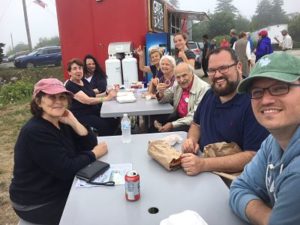
My family in Maine. Image: Nine smiling middle-aged and old people at picnic tables in front of lobster shack
Nevertheless, I get the blues. I feel dark clouds looming just behind me. I try not to spend all my time on them – I use an app to block social media for twenty four-hour stretches, don’t read news at the beginning or end of the day, listen to music more than to NPR.

Image: white butterfly logo on green background with message: You are free. Go do great things. website: freedom.to
But there is no app to suppress my thoughts, and other people’s troubles haunt me. The people who have lost their jobs, who will lose their homes. The kids who graduated from high school or college in the spring, into a world of few possibilities. The teachers, struggling to teach simultaneously in person and by Zoom, maligned in letters to the editor and on social media. All the essential workers, fearing for their health. The hospital workers fighting death daily. The people on ventilators, dying alone, and their families. Nursing home residents and prisoners.
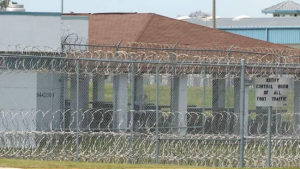
Lowell Correctional Institution (in August, 900 of 2200 inmates tested positive). Image: cinderblock building with coiled razor wire.
And behind that cloud of sorrow is shame. After years of imperialism abroad and inequity at home, I didn’t think I had any patriotism left until we failed so miserably in this latest trouble. Our government is a terrifying disgrace.We have managed to turn public health into a divisive political issue, and we can’t even work out how to produce enough protective equipment. Every couple of weeks a cellphone records another murder of a Black person by a police officer, usually followed months later by a slap on the wrist, or less, for the killers. Above it all, a looming cloud of fear. What will happen in November? And what will happen in the months between the election and the inauguration?
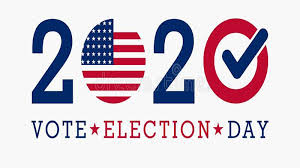
image: sign “2020 Vote Election Day” blue and red letters, flag logo
Well into the summer I was faithful about routines. I worked out every other day, swam, weeded in the garden. I revised my novel twice at my publisher’s suggestion, wrote five chapters of another novel, sent a query to an agent, worked on my website. Mostly confined to my house, I almost achieved the productivity of a writers’ retreat. Then sometime in August my energy flagged. Now I have turned to music.
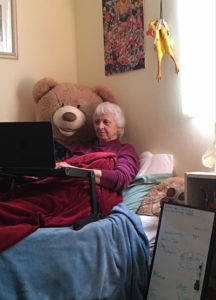
In my writer’s retreat. Image: white-haired author in bed under red blanket working at laptop, leaning on huge teddy bear with yellow rubber chicken dangling above
I have long been a fan of Black gospel, with its rocking rhythms, powerful harmonies and soaring solos. I listen to it on long car rides. When I work out I listen to gospel and sing along with any breath I have to spare. It’s not just the music; the words cut right to my heart. Some songs make me jubilant, others make me cry. An atheist, I’m not sure why gospel moves me so profoundly, but I think it’s the mixture of joy, sorrow and hope.
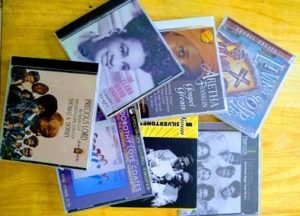
image: pile of CD’s: Clara Ward, 2 gospel compilations, Aretha, Silvertones, Dorothy Coates
Emily Dickinson called hope “the thing with feathers,” a bird that sings “sweetest in the Gale” and keeps us warm. I think we hold onto it even when we don’t believe. The darkest thing is despair. It leaves us unable to move, unable to act. Even delusional hope lets us move forward.

Despair. image: woman in jeans seated on floor against gray wall in empty room, knees drawn up, head rests on arms. Photo by pixabay at pexels.com – resized
Like gospel, classical choral music moves me deeply. I used to sing in large choruses. To hear many voices sing complex music is thrilling; to stand in the middle of the ocean of glorious sound and add your voice is sublime. In August I took an online course in choral repertoire that focused on requiems. I was already familiar with the Mozart; when the class was over I decided to study the Berlioz, Britten and Brahms.
I printed out the librettos with translations. It’s hard to follow along – unlike gospel, in classical works the music is more important than the words, and composers often stretch syllables over many measures. But reading the text gives me some sense of the meaning, and I’m slowly learning to recognize each movement.
The Mozart and Berlioz are based on the Roman Catholic mass for the dead. They focus on the Day of Judgment and the horrors of Hell. They plead for forgiveness and eternal rest. The Brahms uses biblical texts to offer consolation to mourners. It acknowledges grief, promises joy, and doesn’t get grisly about Hell. The Britten War Requiem mixes texts from the mass with bitter poetry by Wilfred Owen, killed in World War I at age 25.
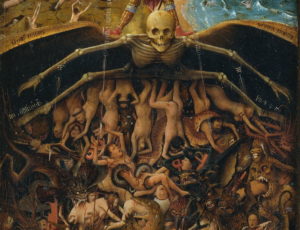
Two kinds of Hell. image: detail of The Last Judgment by Jan VanEyck – skull looms over naked tortured souls
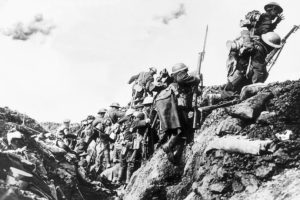
Two kinds of Hell. image:black&white photo of WWI soldiers going over the top of trench in Battle of the Somme, 200,000 British soldiers were killed on the first day.
Recently I broke my cardinal rule, and read the New York Times first thing in the morning. It was truly disheartening, especially Thomas Edsall: “Five things Biden and his allies should worry about.“ I was already worrying about most of them. It made me angry, made me wonder whether the Rump has taken over everything, and has the Times helping him in his strategy of sowing chaos, confusion and fear.
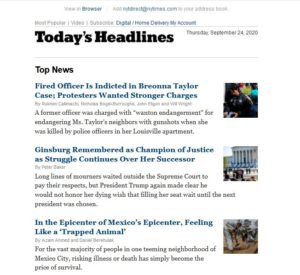
image: Sept 24 NY Times headlines re Breonna Taylor indictment, death of Justice Ginzburg, Covid 19 in Mexico,
So, after crushing myself with bad news, I turned on the gospel music. The Staples Singers told me “I know a place where aint nobody worried,” and promised “I’ll take you there.” The Mighty Clouds of Joy urged me to take a load off my mind and “Ride the Mighty Glory.” I danced, lifted weights, slam-balled, squatted. And when Shirley Caesar sang that great tearjerker for moms and grandmas, “No Charge,” I cried the tears that have been building for months. Then I jumped in the cold pool and sang, “High upon the mountain, leave my sorrows down below.”
It all energized me. I wrote for a couple of hours, then sent an email to the Democrats offering to volunteer. I weeded until I got too hot. I made a carrot cake as a treat for Joe the law teacher and Amanda the high school senior, who are both dealing with HyFlex – the unwieldy scheme for teaching students online and in person at the same time.
The War Requiem is next on my study agenda. When we studied it in class it sent me back to Pat Barker’s Regeneration trilogy, about the British psychiatrist in World War I who treats soldiers sent home with shellshock so that they can return to the trenches. I read the bitter war poetry of Owen and Siegfried Sassoon, both characters in Barker’s novels. Like the Britten, Barker’s trilogy is a brilliant anti-war work of art.
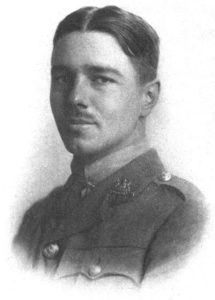
Wilfred Owen. Image: young man in soldier’s uniform with mustache and slicked down black hair parted in the middle
I learn most of my history from fiction. We’re living in a very hard time, but human history is filled with hard times, when fear, confusion and conflict reigned. Lies flew from all sides. People struggled to understand, to find meaning, to figure out what to do. There were many villains, but there were also heroes. My granddaughter asks me why I like to read about hard times, and I tell her it moves and inspires me to see how people survive and sometimes triumph over trouble. It gives me hope.

The thing with feathers. nimage: European robin, gray bird with rufous head and breast, singing on branch against gray sky. Photo: Pixabay at pexels.com

Liz, you took me on a roller coaster ride, singing and screaming at the same time. Longing for the quiet path in nature, I found respite along the way, as your words wove patterns in my mind and salty water in my eyes. You are a wonderful writer, seasoned with appreciation & participation in the arts. Never stop writing. The world needs your words, your passion, your perspective.
Janet – THANK YOU so much.There’s nothing as nice as detailed praise.
LIz, watch The Sapphires on Netflix if you haven’t already. Relevant, sweet, touching and funny, it is full of soul music, including “I’ll take you there.” It is one of those old faves that I re-watch.
Hang onto hope!
Love you.
K
Liz, I love reading what you write. Thank you.
Lizzie, once again, you stun me with your compassionate understanding and perspective on this world, particularly at this trying time. Loved reading this post, and have forwarded it on to friends.
I’m now going to listen to some music.
Stay safe and well.
This is a wonderful blog. I have the same feelings – I shouldn’t be depressed because I’m so lucky, but watching the serious situations so many are in, it’s hard not to feel overwhelmed. I just downloaded and listened to a favorite song. It really helped. Thank you for your great advice. Stay well and stay safe